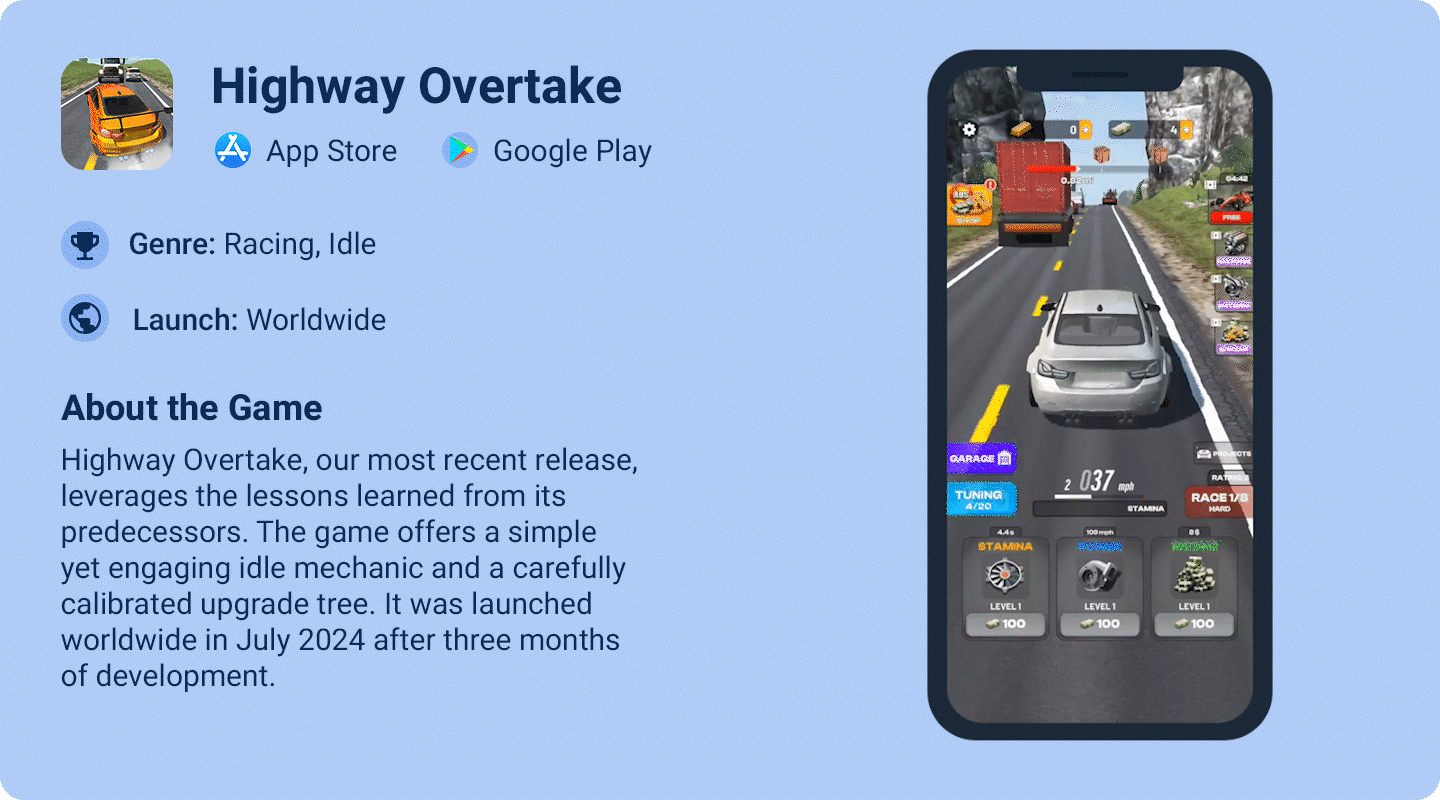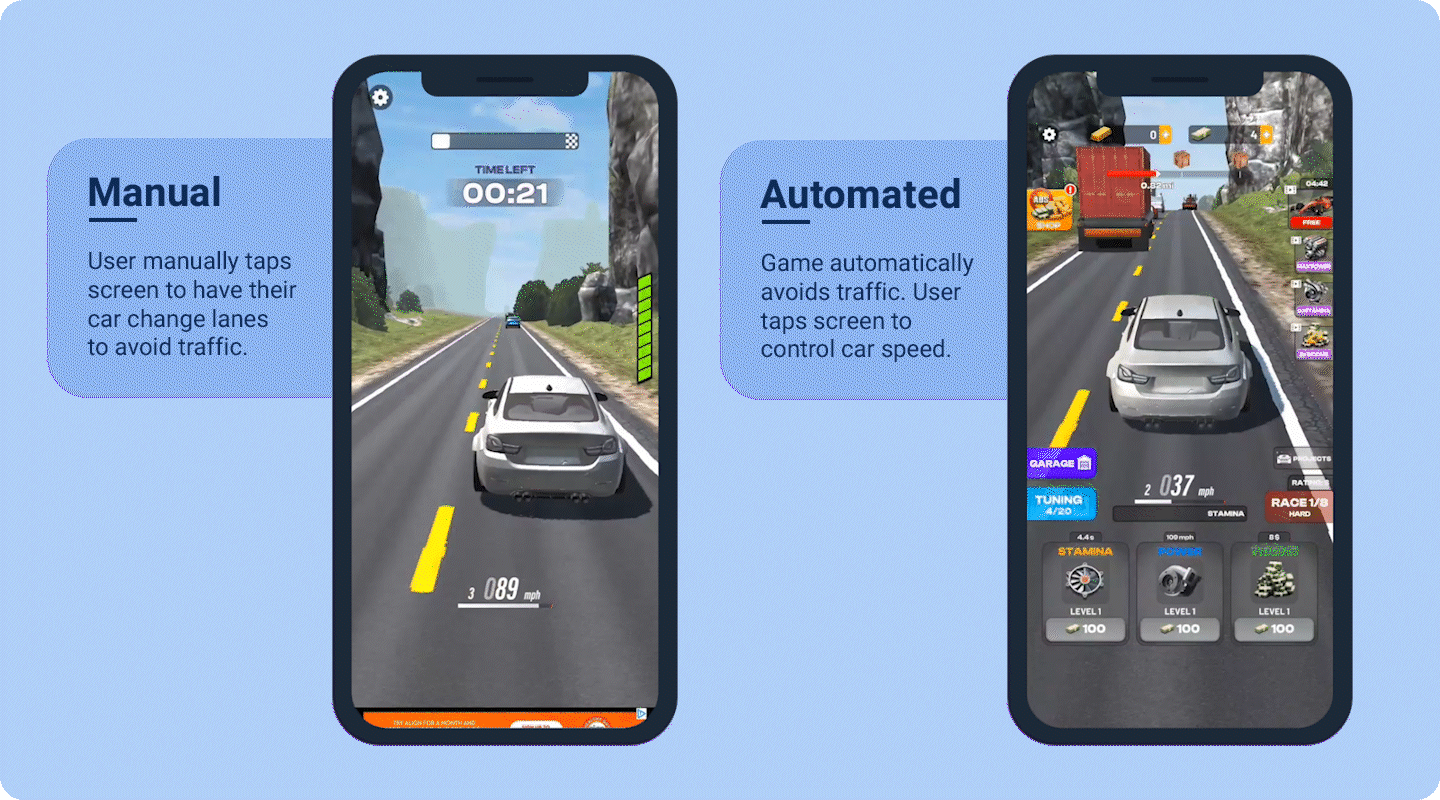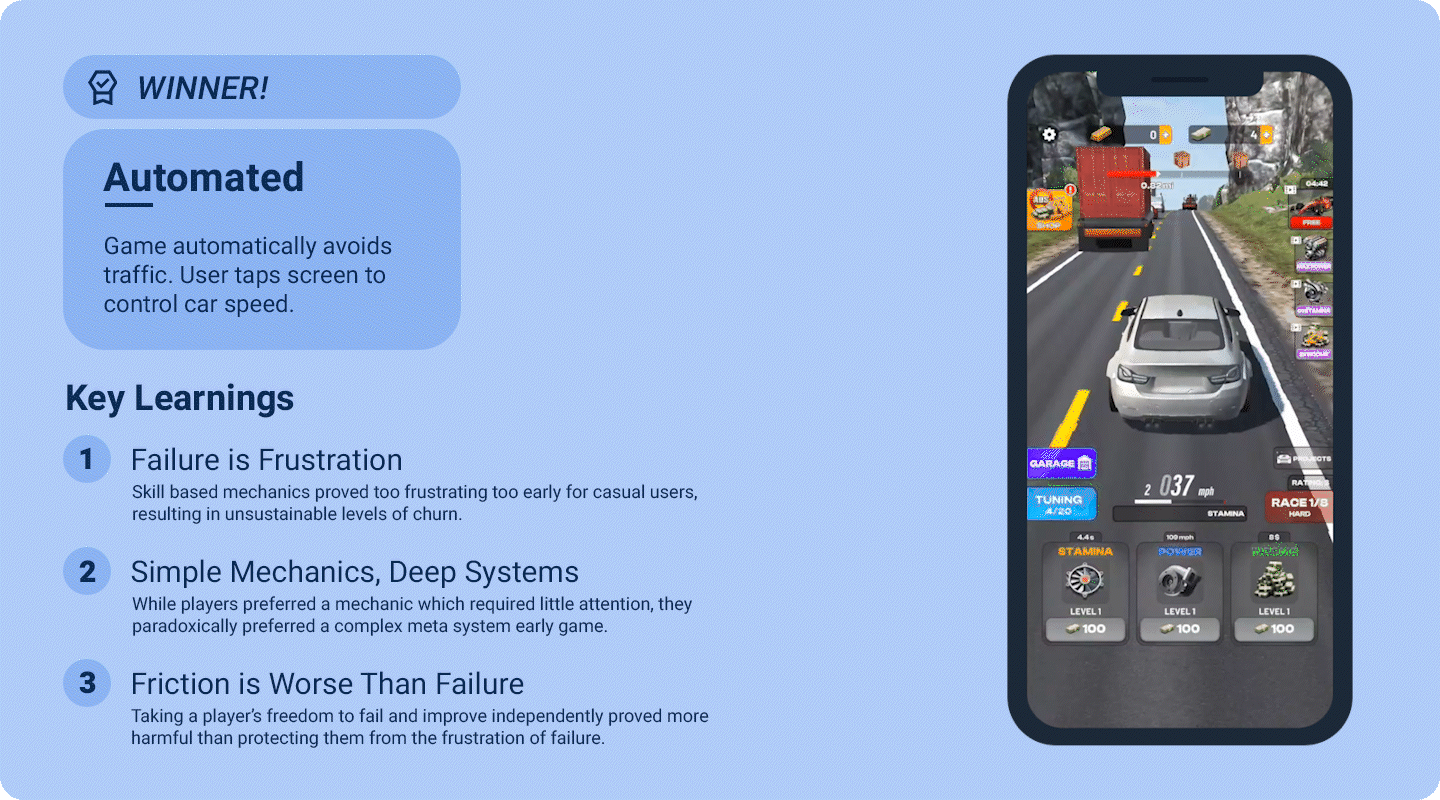

About HyperMonk Games
Founded in 2021, HyperMonk Games has specialized in building a comprehensive ecosystem of car-themed games that span hyper-casual, hybrid casual, and idle genres. Their 17-member team based in Ankara has built a self-published portfolio of over 50 million global downloads. A cornerstone of their success is the continuous testing and refinement of old features in new games and new features in old games. Oguz, the Game Design Lead at HyperMonk Games, details in this case study how their team streamlined the launch of their most recent top chart hit, Highway Overtake.

About Highway Overtake

At the Beginning: Getting Under The Hood
Highway Overtake’s initial split test focused on refining the game's core mechanic. Originally, the game was designed with a manual skill-based 'passing' system, which was tested against an automated idle version of this mechanic. According to Firebase, the automated mechanic resulted in a higher LTV. However, before fully adopting this new mechanic, we needed to delve deeper into the reasons behind this outcome.
Comparing Critical KPI’s and Level Fail Rates between Game Mechanics with Breakdowns
Using the Custom Event Filters equipped across ByteBrew’s out-of-the-box Engagement dashboards, we measured the impact of each test’s experiment on critical KPIs such as Session Lengths, Playtime and Retention. Comparing each experiment illustrated a clear decrease in core KPIs when players were introduced to the skill-based gameplay.
Seeing lower core KPIs on our manual, we moved to ByteBrew’s Breakdown tables to quickly analyze how the skill-based gameplay affected level fail rates.

About Breakdowns: Breakdowns is a popular tool on ByteBrew used to deep dive into how your players interact with your game's custom events by generating a granular table of user engagement metrics using your custom event's subparameter values.
Parallel to the core KPIs, the level fail rates were much higher than the automated rates. This report was also confirmed by using ByteBrew’s closed Funnels to confirm that failure was indeed causing churn.
Deep Diving into the Core Mechanic with Breakdowns
After diagnosing each variant’s KPIs, we began split testing different mechanics within the winning automated idle variation. The first required the user to tap to have their car enter the left lane, which had no oncoming traffic, and would re-enter the right lane when stamina was depleted. This was tested against a version where the user exclusively controlled speed (which drains stamina), and the vehicle automatically dodged the other cars in both lanes of traffic. The fully automated version produced higher LTVs.

To comprehend the reasons for the automated mechanic's superior performance, we analyzed player churn using Breakdown tables to measure how players were completing levels.

The results from that query showed Level Complete rates were higher in the fully automated version, and using ByteBrew’s aggregation functions within our event parameters, we compared engagement in the upgrade system and currency sink across variations.
Balancing Upgrade Systems with Mechanics
Continuing from these insights, our next key experiment focused on comparing the effects of restricted versus extensive customization options for the player’s vehicle during the first time user experience. According to Firebase, players with more customization options had a higher LTV. We utilized ByteBrew’s Breakdowns to quickly measure overall engagement with the customization system and Mechanics to convert multiple data points into easy-to-read visualizations, capturing what was purchased, at which level, and in which experiment.

About Mechanics: Mechanics is a developer's data playground where you can design queries on your game's data, build segments to examine how different user groups interact, and visualize your data exactly how you request.
Noticing strong user engagement with the meta system and understanding that failure led to churn, we then tested the impact of mandating users to buy a specific number of upgrades before unlocking the Racing Game mode which now used an improved version of the original skill based mechanic.

This experiment resulted in lower LTV and overall KPIs, and paradoxically, engagement in the upgrade system dropped as users were pushed to meet higher engagement thresholds, despite Hypermonk’s attempt to protect the player’s from failure.
Maximizing Reward Video Monetization with Cohorts
With a solid foundation of player engagement, we set up a test introducing monetization systems that enabled players to unlock upgrades for their cars by watching Reward Video Ads to measure how players monetization behavior changed.

About Cohorts: Cohorts is an incredibly useful tool to visually see the transition of users starting from one event and moving to another.
During the initial test for the new Reward Video upgrades, we experienced an increased LTV without degrading engagement KPIs, and yielded higher rates of upgrades, further deepening player’s connection with their cars.
We also introduced our Chest System into the Customization screen, and experimented with the rewards distribution optimal for this specific release.

The highest LTV variant was produced by the version that distributed NO money in the chest system. This further highlighted player motivation to engage with the idle mechanic to earn progression in the meta system, and safely maintained the balance of the economy.
Final Results

Through the utilization of ByteBrew’s product analytics, we decisively determined the highest performing game mechanics to globally launch and created new monetizing systems to maximize our player LTVs. Locating these gameplay optimizations allowed us to release world wide in under three months and achieved #5 Top Free Games on iOS.

“ByteBrew’s streamlined analytics suite simplified our game’s split testing process, enabling our team to determine the logic and motivation behind our test’s results; shortening the timeline from development to global launch within 3 short months.”
Oguz, HyperMonk Games, Game Design Lead
